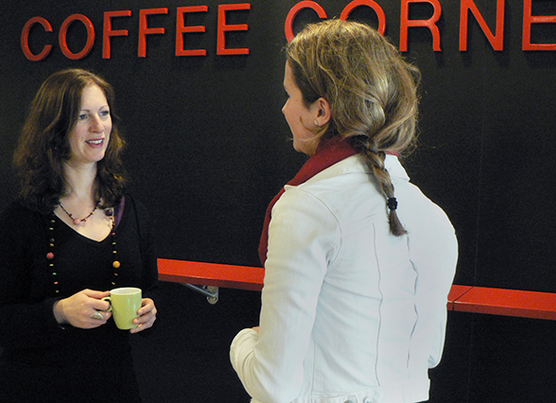Profile
Julija Mell is an Associate Professor of Organisational Behaviour in the Department of Organisation and Personnel Management of Rotterdam School of Management. She is the Academic Director of the Cologne-Rotterdam Executive MBA. She obtained her PhD in Organizational Behavior in 2015 at Erasmus University Rotterdam and her Diploma in Psychology in 2010 at the Humboldt University Berlin, Germany.
Her research focuses on collaboration across boundaries – for example, bridging cognitive boundaries within diverse teams, bridging geographical and cultural boundaries within globally dispersed teams, and bridging structural boundaries within complex social systems and networks. Her work has been published in leading academic journals such as the Academy of Management Journal, Organization Science, Journal of Applied Psychology, Organizational Behavior and Human Decision Processes, and Journal of Management Studies. Her research has been recognized by several awards, including the ERIM Outstanding Performance by a Young Researcher Award (2021), the ERIM Top Article Award (2021), the Academy of Management’s Managerial and Organizational Cognition Divison’s Best Paper Award (2021), and INGroup’s Best Conference Paper Award (2019).
Julija teaches on topics surrounding Organizational Behavior, Teams, Leadership, and Social Networks in RSM’s Bachelor, Master, Full-time MBA, Executive MBA, and Executive Education programs.
Publications
Article (11)
Academic (10)
-
George, M., Strauss, K., Mell, J., & Vough, H. (2023). When “Who I Am” Is Under Threat: Measures of Threat to Identity Value, Meanings, and Enactment. Journal of Applied Psychology, 108(12), 1952-1978. https://doi.org/10.1037/apl0001114
-
Mell, J. N., van Knippenberg, D., van Ginkel, W. P., & Heugens, P. P. M. A. R. (2022). From Boundary Spanning to Intergroup Knowledge Integration: The Role of Boundary Spanners’ Metaknowledge and Proactivity. Journal of Management Studies, 59(7), 1723-1755. https://doi.org/10.1111/joms.12797
-
Mell, J. N., Quintane, E., Hirst, G., & Carnegie, A. (2021). Protecting Their Turf: When and Why Supervisors Undermine Employee Boundary Spanning. Journal of Applied Psychology, 107(6), 1009-1019. https://doi.org/10.1037/apl0000960
-
Mell, J. N., Jang, S., & Chai, S. (2021). Bridging temporal divides: Temporal brokerage in global teams and its impact on individual performance. Organization Science, 32(3), 731-751. https://doi.org/10.1287/orsc.2020.1406, https://doi.org/10.1287/orsc.2020.1406
-
Mell, J., DeChurch, L., Leenders, R., & Contractor, N. (2020). Identity Asymmetries: An Experimental Investigation of Social Identity and Information Exchange in Multiteam Systems. Academy of Management Journal, 63(5), 1561-1590. https://doi.org/10.5465/amj.2018.0325
-
van Knippenberg, D., & Mell, J. (2016). Past, present, and potential future of team diversity reearch: From compositional diversity to emergent diversity. Organizational Behavior and Human Decision Processes, 136, 135-145. https://doi.org/10.1016/j.obhdp.2016.05.007
-
Koellinger, PD., Mell, J., Pohl, I., Roessler, C., & Treffers, T. (2015). Self-employed But Looking: A Labour Market Experiment. Economica, 82(325), 137-161. https://doi.org/10.1111/ecca.12115
-
Ziegler, M., Poropat, A., & Mell, J. (2014). Does the length of a questionnaire matter? Expected and unexpected answers from generalizability theory. Journal of Individual Differences, 35(4), 250-261. https://doi.org/10.1027/1614-0001/a000147
-
Mell, J., van Knippenberg, D., & van Ginkel, W. (2013). The Catalyst Effect: The Impact of Transactive Memory System Structure on Team Performance. Academy of Management Journal, 57(4), 1154-1173. https://doi.org/10.5465/amj.2012.0589
-
Schoeder, T., Rogers, K. B., Ike, S., Mell, J., & Scholl, W. (2013). Affective Meanings of Stereotyped Social Groups in Cross-Cultural Comparison. Group Processes and Intergroup Relations, 16(6), 717-733. https://doi.org/10.1177/1368430213491788
Professional (1)
-
Mell, J., van Knippenberg, D., & Ginkel, W. (2014). The catalyst effect: how meta-knowledge can improve team performance. RSM Discovery - Management Knowledge, 20(4), 18-19. http://hdl.handle.net/1765/77376
Chapter (2)
Academic (2)
-
van Knippenberg, D., & Mell, J. N. (2017). Team diversity and learning in organizations. In The Oxford Handbook of Group and Organizational Learning (pp. 475-490). Ithaca/Oxford University Press.
-
Knippenberg, D., & Mell, J. (2017). Team diversity and learning in organizations. In L. Argote, & J. Levine (Eds.), The Oxford Handbook of Group and Organizational Learning (pp. 475–490). Oxford University Press. https://doi.org/10.1093/oxfordhb/9780190263362.013.44
Doctoral Thesis (1)
Internal (1)
-
Mell, J. (2015). Connecting Minds: On the Role of Metaknowledge in Knowledge Coordination. [Doctoral Thesis, Erasmus University Rotterdam]. Erasmus University Rotterdam (EUR).
Working paper (1)
Academic (1)
-
Incerti, V., Mell, J., Jang, S., Mortensen, M., & Yücesan, E. (2020). Who benefits from multiple team membership? An investigation of how the structure of MTM shapes team- and system-level performance. Advance online publication.
Courses
Organisational Behaviour
- Study year: 2023/2024, 2022/2023, 2020/2021
- Code: BK1202
- Level: Bachelor 1, Pre-master
Organisational Behaviour
- Study year: 2023/2024, 2022/2023, 2021/2022, 2020/2021
- Code: BT1202
- Level: Bachelor 1, Bachelor 1
Past courses
Managing Individuals & Teams
- Study year: 2021/2022
- Code: BM12HRM
- Level: ERIM, Exchange, IM/CEMS, Master
Managing Individuals & Teams
- Study year: 2020/2021
- Code: BM06HRM
- Level: ERIM, Exchange, IM/CEMS, Master
OLD STYLE - Managing People in Organisations
- Study year: 2020/2021, 2019/2020, 2018/2019
- Code: BM05HRM
- ECTS: 5 Level: Master
Modern Applied Statistics
- Study year: 2018/2019
- Code: BERMAMC018
- ECTS: 4 Level: Master
Leadership in organisations: people as key to excellence
- Study year: 2014/2015
- Code: BKBMIN004
- ECTS: 15 Level: Bachelor 3
Organizational Behaviour
- Study year: 2014/2015
- Code: BAP071
- ECTS: 6 Level: Bachelor 1, Bachelor 1
Featured in the media
-
Death by a thousand paper cuts: How subtle workplace discrimination can undermine our sense of self
Understanding Identity Threat in the Workplace
Monday, 23 October 2023 -
How Workplace Discrimination Can Undermine Our Sense of Self
Understanding Identity Threat in the Workplace
Friday, 13 October 2023 -
The risks and rewards of networking within your own organisation
A team led by assistant professor Julija Mell of RSM recently completed research focused on the potential pitfalls of boundary spanning.
Friday, 8 October 2021 -
Should you keep your boss in the loop when connecting with people from other departments?
Julija Mell, Assistant Professor in the department of Organisation and Personnel management at RSM was part of a new research about connecting employees in different department.
Friday, 24 September 2021



